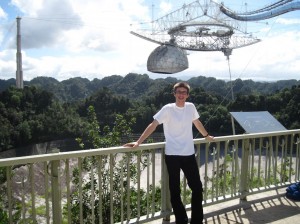
Michael Pinkard ’14 at Arecibo Observatory in Puerto Rico
Here on Earth, Michael Pinkard ’14 (Puyallup, Wash.) is part student physicist and part jazz musician. With his tenor sax in hand, Pinkard—a Creative and Performing Arts scholar as well as Marquis Scholar—can be seen performing around campus with Lafayette’s Jazz Ensemble and Jazz Combo, delighting audiences with his mastery of music.
But Pinkard is interested in another kind of music as well, the music of the cosmos, and keeps close watch on what that radio station is playing.
Pursuing a dual B.S. in physics and mathematics, Pinkard aspires to earn a Ph.D. in physics. He is fascinated by the mysteries the universe holds and the role physics plays in exploring them.
“We understand how stars form and die, we have ideas about how our galaxy formed and we can—with our current knowledge—model the universe from the very first instant after the Big Bang. Plus, there is so much that we are still learning! We are still searching for a way to unify general relativity and quantum mechanics, the two most mind-bending ideas to come out of the 20th century, and we are still wholly ignorant of [about] 95 percent of our universe! We understand only about one-twentieth of the observable universe. The rest of it—dark matter, dark energy—is still mostly a mystery,” he says.
The way to “see” that dark matter and dark energy is to listen for it. And to do that, you need a really big antenna. Like the one at the Arecibo Observatory in Puerto Rico. Built into and suspended from hills, the enormous 300-meter-diameter antenna can be used to detect cosmic radio signals.
In January, Pinkard got to see the antenna up close when he travelled with physics major Ryan Payne ’12 (Pequannock, N.J.), and Lyle Hoffman, professor of physics, to Arecibo to attend the undergraduate ALFALFA workshop.
Since 2005, ALFALFA (Arecibo Legacy Fast ALFA Survey) has been surveying the sky to pick up faint cosmic radio signals from “dark galaxies” and is expected to detect 20,000 galaxies out to a distance of 750 million light years.
“It was one of the best experiences of my life. We—the undergrads involved with the ALFALFA project—connected amazingly well. When everyone has a passion for the same topic, a group can form a strong connection in just a short time. We were out exploring Arecibo and stargazing every night, hardly sleeping because we had so much to do together in such a short time,” Pinkard says.
Also in January, he and Hoffman presented research at the meeting of the American Astronomical Society in Austin, Texas. Their research involved an analysis of data from the ALFALFA survey using the Arecibo Radio Telescope and the Sloan Digital Sky Survey, a large online database with optical observations of over 500 million stars and galaxies.
Pinkard still finds time to practice, perform, and compose music, particularly jazz. In addition to the two jazz groups, he is involved with the Contemporary Music Ensemble and has played in the Concert Band and Symphonic Orchestra. He also studied jazz improvisation with Skip Wilkins, professor of music, and is looking for more ways to pursue his musical interests.
In the meantime, Pinkard can often be seen playing at Cafe Nights at Gilbert—or perhaps doing a little stargazing.

3 Comments
Great to see a picture of Michael and hear his thoughts. We are proud to know him.
Awesome job man! Keep up the good work!
Thank you for sharing the story of this inspirational and talented young man.
Comments are closed.